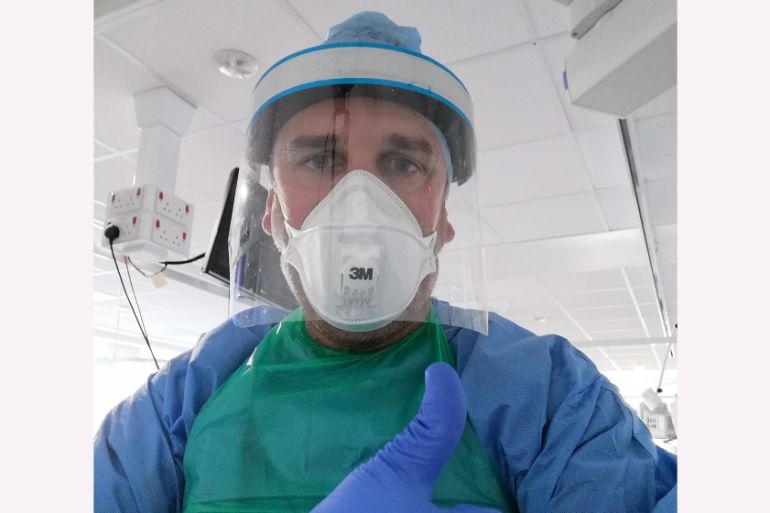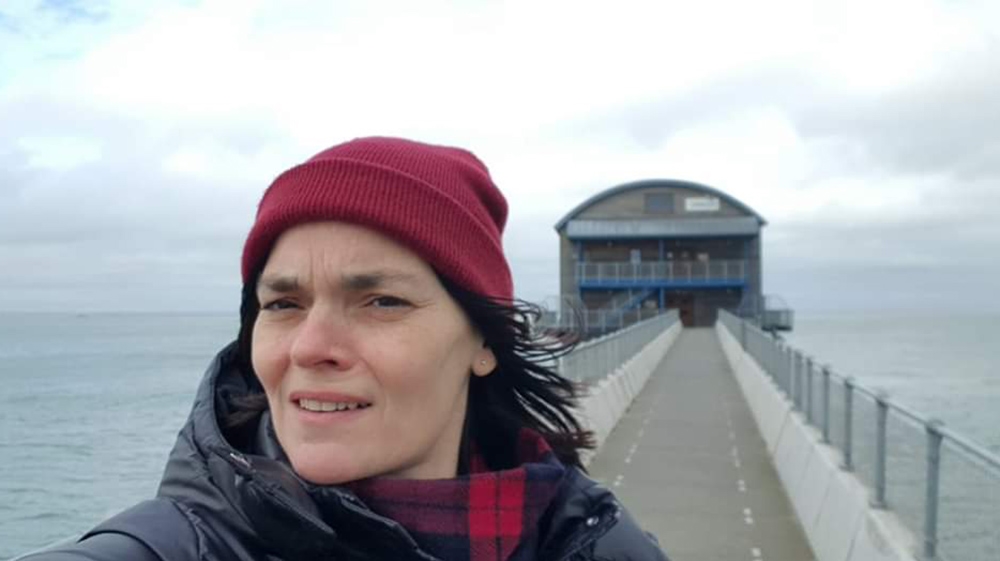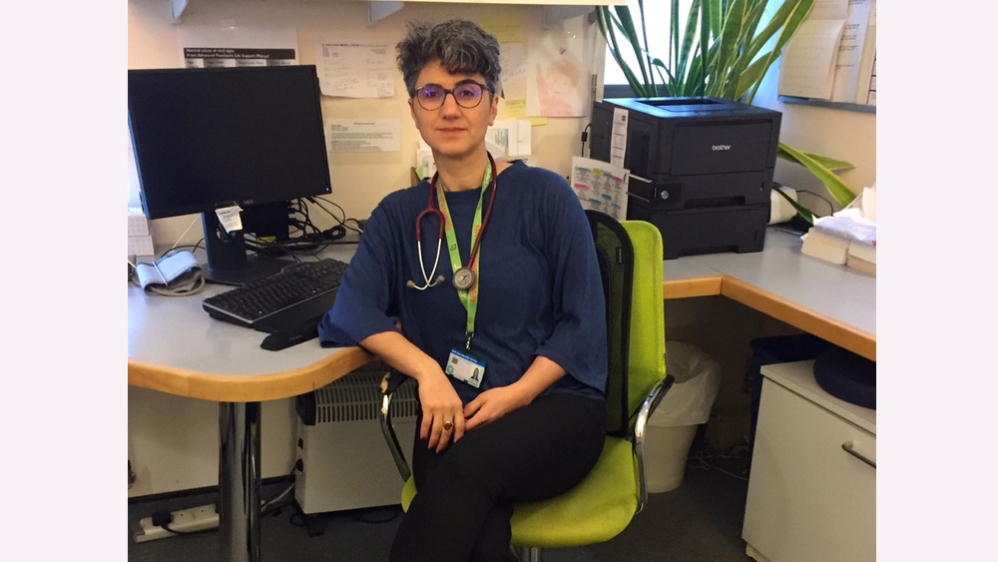As Brexit nears, EU workers fortify UK’s coronavirus front lines
Thousands of EU migrants work as doctors, nurses, carers, cleaners and porters as the UK fights gravest threat in years.

London, United Kingdom – Thousands of EU migrants are working on the front lines of the coronavirus pandemic in the United Kingdom, as doctors, nurses, carers, porters and cleaners.
Others are still out every day, repairing water boilers, stocking supermarket shelves, driving London’s buses.
Keep reading
list of 4 itemsWill the US unemployment rate continue at historic lows?
Mexico’s teachers seek relief from pandemic-era spike in school robberies
‘A bad chapter’: Tracing the origins of Ecuador’s rise in gang violence
Every Thursday at 8pm, Britons take to their windows and balconies to applaud them for keeping the country on its feet.
With the number of recorded deaths now above 16,000, the severity of the crisis has eclipsed the political fallout over Brexit.
But the clock is still ticking towards the end of the transition period on December 31, as well as a June 21 deadline for EU citizens to apply to remain in the United Kingdom through the EU settlement scheme.
Charities have warned that the pandemic may have an impact on those applications as resources are redirected to fend off brewing social and economic crises.
A points-based immigration system announced earlier this year sets a minimum salary threshold at 23,040 pounds ($28,755) – meaning low-paid “key workers” would be unable to stay.
The average salary of a care worker, a sector that relies heavily on migrants, is well under 20,000 pounds; hospital porters and cleaners earn even less.
Al Jazeera heard the stories, concerns, and hopes of four EU migrants who are keeping the UK ticking through the crisis.
‘I don’t want clapping. I want the government to give me proper wages‘
Joan Pons Laplana, 45, Spanish intensive care nurse in Yorkshire
I started working in intensive care 20 years ago. Lately, I was a senior nurse doing digital projects, but because of the coronavirus, all projects have been stopped, and I was brought back to the front line after 10 years.
I work 12-hour shifts, three days a week. I spend half an hour [getting] dressed to be able to work.
It’s tough when you go home one day, and when you go back the next, the person you were taking care of has passed away. It makes you realise how fragile we all are. Some of the patients are younger than I am, and that’s even more scary.
I am divorced, and at the moment, I am not seeing my children to avoid transmitting them the virus. I hear more and more doctors are dying because they are being exposed without PPE [personal protective equipment]. And in the community [among first responders and home visit nurses] it is even worse than inside hospitals.
I’m also a father, a son; I am not just a nurse. And besides that, I am European. Until a few weeks ago the government didn’t want us. Suddenly in the last three weeks, I went from being a low-skilled worker to a key worker.
Part of me … every time they do the clapping, I think I don’t want clapping. I want the government to give me proper wages, to start treating me like a proper human being, to recognise the work we do. I need security for my future, and settled status doesn’t give me security. Nothing is resolved.
‘We can’t avoid close contact’
Bartosz Glinkowski, 38, Polish delicatessen owner in southwest London

We only allow in four people at a time. The masks, the gloves, we have always been using them for certain things, but now we use them all the time. We put a plastic screen up in front of the counter.
It is not easy, and in the end, we can’t avoid close contact, to be honest, the shop is not that big … we are worried, and I have three kids – one is three months old. But if you have to do it, you have to do it, you know.
I opened this shop six years ago, but have been in the UK for 17 years. It’s become a bit quieter since the referendum; business has been going down gradually by around 20 percent.
Lots of my regulars have gone back home.
Now, the store is even busier than normal … people try to avoid crowded places and go to the smaller shops instead of large supermarkets, and tend to avoid going far from their houses as much as possible, I think.
‘If all caregivers quit right now, it would be a disaster’
Patricia Trigo Diaz, 50, Spanish care worker on the Isle of Wight

I have a law degree and have worked for a cultural and social foundation and several non-profit organisations in Spain. I came to the UK in December to work as a home care worker, for which I trained, obtained the required qualifications and registered.
I had planned to stay a few months and return to Spain to rest and attend to my affairs there before coming back to work in the UK, but I had to rethink everything. On the one hand, you think about whether you should return to your country and surround yourself with what you know. On the other, you value the work you are doing and what you contribute.
The fact that [I am] taking care of an 89-year-old woman who cannot stand on her own, and the responsibility that entails, and being among the groups at risk has given me more reasons to stay. Imagine if all the caregivers quit their jobs right now; it would be a disaster.
My intention is to [apply for] pre-settled status in a few months. I think it would be very unfair that after having accepted the challenge and the responsibility of staying in my job right now, I have some kind of problem in the future.
‘There are so many features to my identity that are vulnerable, and this is just painted over by the clapping’
Roghieh Dehghan Zaklaki, Austrian-Iranian GP in north London

The way we deliver medical care has completely changed. In the last few weeks, we have been doing consultations over the phone [and on video]. I still go to my practice, but there is much less interaction. We still have our emergency list, but most of that is now taken over by concerns about coronavirus. It has taken over all our work.
I was born in Iran, and migrating to Austria was my father’s choice. But moving to the UK was my conscious and deliberate choice as a grown-up woman after doing my medical training in Austria. One of the reasons I came here was renowned British tolerance, and because of the reputation for excellence of general practice and primary care here in the UK.
[These] reasons are related to a particular image that I had of the country and its medical institutions. That was the reason I was so heartbroken after the referendum. [I felt] gradually but steadily marginalised, alienated and devalued in British society.
I used to think of the NHS as “our” NHS, used to be so proud of it. Then because of [the introduction of] policies restricting access to some groups like undocumented migrants, it didn’t feel like my NHS any more.
There are so many features to my identity that are vulnerable, and this is just painted over by the clapping. I become invisible as a migrant, as an EU citizen. If you look around, look at the faces in the real-life NHS. They resemble the faces of [UK far-right figure] Nigel Farage’s anti-immigration bus.